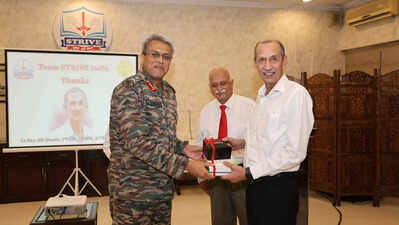ARTICLE AD BOX

LUCKNOW: India must remain fully prepared for future challenges as Operation Sindoor has significantly elevated the stature of the Pakistan Army and its chief, Gen Asim Munir within Pakistan — a development that could embolden Islamabad to intensify its support for cross-border terrorism.
The point was raised by Lt Gen DS Hooda (retd), the architect of the 2016 surgical strikes. He was speaking at a session, titled, ‘Operation Sindoor – Challenges on account of emerging geopolitical scenario and the need for a course correction for India to respond', organised by STRIVE India on Friday. Explaining his view, Lt Gen Hooda — a decorated officer with PVSM, UYSM, AVSM, and VSM told TOI, “The Pakistan army was under tremendous pressure.
Supporters of Imran Khan, once a dominant political force, had turned against the military establishment. The attack on the Lahore Corps Commander’s house was not just symbolic—it was unprecedented. For the first time, the Pakistani public openly challenged the institution that had long held unassailable authority.
”“This unrest stemmed from the controversial banning of PTI during elections, yet the party still managed to secure the most seats as independents.
The Pakistani army was seen as propping up an unpopular government, leading to widespread discontent. There was a sense that the Pakistani army had dropped a government which is not a popular government,” he said.“However, the tide began to turn with the Sindoor operation. As instability gripped the nation, the people rallied behind the military. The promotion of General Asim Munir to Field Marshal marked a consolidation of power.
In civil-military relations, the Pakistan army has now acquired a stronger position,” Hooda noted.He said, “With the military’s influence growing, there is going to be potential escalation in cross-border terrorism. If the military has greater say in relations with India… then we know how the Pakistan army thinks. The ideological divide, the persistent rhetoric around Kashmir, and the belief in India as an existential threat could embolden riskier behavior.”Cautioning for vigilance, Hooda said, “Adding to the complexity is Pakistan’s geopolitical posture. With China’s backing and improving ties with the US, the army may feel emboldened to double down on its proxy war strategy. This could well happen.”Meanwhile, acknowledging the operation’s tactical success Lt Gen Hooda, cautioned against overlooking its long-term strategic consequences. Hooda told TOI, “Operation Sindoor was an 88-hour conflict.
The Navy wasn’t involved at all, the Army played a minimal role, and the Air Force’s engagement was largely limited to long-range rocket systems. This cannot be the blueprint for future wars.”He stressed that while the operation showcased India’s growing military capabilities, especially in terms of indigenous technologies, future conflicts may demand full-spectrum involvement from all three services — Army, Navy, and Air Force — in a much more coordinated and expansive manner.Drawing parallels with global conflicts like those in Gaza and Ukraine, Hooda argued that India must prepare for scenarios that are far more complex and prolonged. “Operation Sindoor gives us direction, but not doctrine. We must not assume that future wars will follow the same pattern,” he told TOI.At STRIVE India, he praised the performance of indigenous technologies such as the BrahMos missile and the Akashteer electronic warfare suite, calling them symbols of India’s ability to deploy world-class systems.Lt Gen Anindya Sengupta, General Officer Commanding-in-Chief, Central Command also attended the STRIVE India talk. STRIVE India is a Lucknow-based think tank comprising Armed Forces veterans.



.png)
.png)
.png)
















 2 hours ago
3
2 hours ago
3









 English (US) ·
English (US) ·